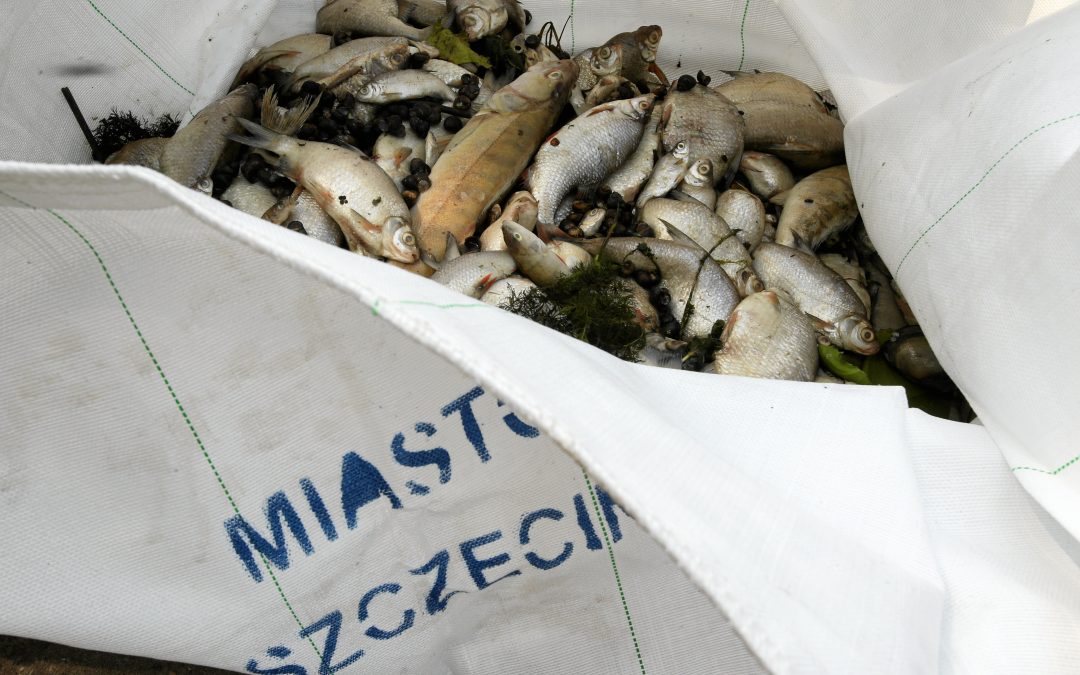Poland’s climate minister has warned that “fake news” is being spread by German media about the environmental crisis in the Oder river, which runs along the border between the two countries and where over 100 tonnes of fish have died for reasons that have not yet been determined.
Meanwhile, the Polish province where the river flows into the Baltic Sea has reported that the situation is “deteriorating” further, with more mass deaths of fish as the water runs low on oxygen. The regional authorities have installed 21 aeration pumps to introduce oxygen back into the water and save fish.
In recent weeks, scientists and officials in both Poland and Germany have been trying to figure out what has caused the mass die-off in the river. Last week, the Polish climate ministry reported that toxic golden algae could be responsible.
Increased saltiness of the water, needed for the golden algae to propagate, has been found by the official measuring station of the state environmental protection authority in Frankfurt (Oder) for about two weeks, German daily Tagesspiegel wrote on Saturday.
The newspaper also reported that a study by Brandenburg state laboratory found extremely high concentrations of pesticides in the Oder between 7 and 9 August. However, it added that this may have “had nothing to do with the fish deaths upstream”.
Fachleute gehen von "multikausalem Ereignis" aus…https://t.co/CQ9YPQL0lw
— Bert Walther (@Bertmwalther) August 20, 2022
In response to the report, Poland’s climate minister, Anna Moskwa, called claims of pesticides in water samples from the Oder “more fake news reproduced in Germany”.
“In Poland, the substance is tested for and found to be below the quantification threshold, meaning it has no effect on fish or other species and no link to die-offs,” she said in a tweet.
The claims regarding pesticides are “an unjustified attack on agriculture”, added Moskwa. “First [it was] industry now agriculture?” she said, referring to previous reports in German media that fish fever was linked to the presence of mercury in the water.
Last week, Moskwa had announced that testing of water and fish from the Oder water has not confirmed the presence of toxins such as pesticides and that radioactive isotopes are below normal levels.
Środek niewykryty w rybach. Substancja, która nie odkłada się w rybach. Nieuzasadniony atak na rolnictwo. Najpierw przemysł teraz rolnictwo? Co następne?
— Anna Moskwa (@moskwa_anna) August 20, 2022
Meanwhile, the governor of West Pomerania province, Zbigniew Bogucki, reported over the weekend that the situation in the Oder is again worsening. Around 16 tonnes of dead fish have been fished out of the water near Szczecin, the capital of the province, which borders Germany.
“The deterioration of the situation is related to two factors,” said Bogucki, quoted by Interia. “On the one hand, this wave coming from the south brought dead fish…On the other hand, it is the accumulation of the second factor, which is the lack of oxygen [in the water, causing more fish to die].”
Bogucki noted that 21 aeration pumps have been dispatched to “mix [the river water] with as much air as possible and thus oxygenate at least the upper parts of the water, closest to the surface”.
He pointed out that, in places where the pumps are operating, the situation is improving. “But we are not able to [completely] reverse these adverse conditions related to the lack of oxygen,” he added.
Main photo credit: Cezary Aszkielowicz / Agencja Wyborcza.pl

Alicja Ptak is deputy editor-in-chief of Notes from Poland and a multimedia journalist. She has written for Clean Energy Wire and The Times, and she hosts her own podcast, The Warsaw Wire, on Poland’s economy and energy sector. She previously worked for Reuters.




















